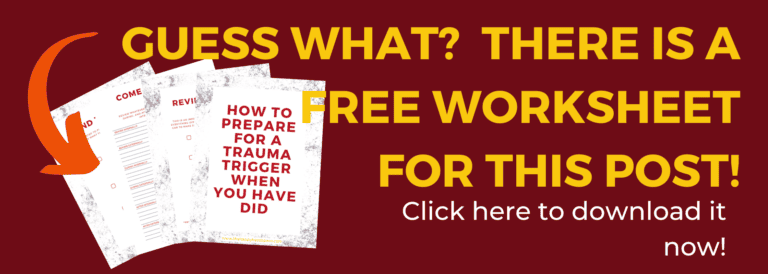When you have Dissociative Identity Disorder, trauma triggers can seemingly pop up from out of nowhere. Dealing with your system’s triggers can be difficult under the best of circumstances but what do you do when you know a trauma trigger is coming? This article will review some tips for preparing your system when you know a trauma trigger is coming so you can all go on your merry way. Let’s get started!
Table of Contents
WARNING AND DISCLAIMER
Because of the nature of D.I.D., it’s possible that something in this article could be triggering to your system. Please use caution and your best judgement when reading this article. Safety first!
Disclaimer: We are not doctors, therapists, or mental health professionals. We’re just a bunch of alters that are speaking from personal experience to help other systems live their best lives.
Find Trauma Triggers And Effected Alters
The first step to preparing for a trauma trigger is to know what the trigger is and who it will be effecting. For example, let’s pretend my system has an alter named Harry Potter. The system has to go to the Ministry of Magic for a routine broom license renewal. Our system knows that the Ministry of Magic is a trigger for Harry. Now we know what the trigger is (Ministry of Magic) and who the trigger will be effecting (Harry).
It’s always a good idea to make sure there is no one else in the system that will be triggered by the same thing. It’s not unusual for triggers to overlap between alters. For this example, we see that our alters Ron and Hermonie are also triggered by the Ministry of Magic.
As best you can, play out the upcoming event in your mind to search for other potential triggers that can be spotted in advance. With our example, we find that our alter Hagrid is not triggered by the Ministry of Magic but he is triggered by an individual that works there.
With this example, we now know that four alters in our system will likely be triggered by going to get our broom license renewed if they’re fronting or co-conscious. That is great info to have because it means we’ll know who we need to protect and how we can do it.
Decide Who Will Do What
Once you know which alters will likely be triggered, it’s time to pick at least one alter that will be able to be with them inside of the headspace. During the actual license renewal, our system will need for the four effected alters to be inside the headspace. This works out great for them because they don’t want to be anywhere near the Ministry of Magic anyway!
Ideally, your system will be able to assign one alter to check on and comfort the alters that are possibly going to be triggered. Even if your affected alters stay deep inside the headspace, it’s a good idea to plan for them experiencing big feelings. The assigned helper will be able to lovingly remind the effected alters of the coping plan your system has in place and help them to implement it.
Next, your system will need to decide who is going to face the trauma trigger. This is the alter that will be fronting. Your system will ideally have three alters capable of facing the trigger. Depending on what the triggers are, the fronting alter might not be phased at all at facing them. In a perfect world, these alters should:
- Not be in any known danger of being triggered
- Be completely capable of being safe externally
- Be completely capable of handling the task necessary
-
-
- Have done it before
-
Unfortunately, there may be times where one alter doesn’t meet all of those check boxes. When this happens, always prioritize safety!
Come Up With A Plan
Now that you know what the trauma trigger is, who the effected alters are, and who will be fronting, it’s time to come up with a plan to put it all together. Essentially, your system should review whatever needs to be done before the event, during, and after. Make sure to come up with an internal and external plan.
Using our broom license renewal example, our plan would look like this:
- Before internally: George and Fred will practice helping internal alters remain calm. Albus (and the back up fronting alters) will make sure he knows where he’s supposed to go and what he’s supposed to do.
- Before externally: The system will collect any necessary information from any alter that may have it and will write it all down.
- During internally: Our four affected alters will relax in the common room deep inside the headspace. George and Fred will take turns checking on them and making sure they’re doing alright.
- During externally: Albus will front and will handle the majority of the broom renewal process. Snape, George, and Fred will be on stand by just in case.
- After internally: The whole system will discuss how everything went and will make adjustments for next time. Any alter that needs self care will get it.
- After externally: The body will get self care if it needs it.
In addition to coming up with that plan, it’s a great idea to have a plan for if something doesn’t go as planned. For example, if Albus was to run into a trauma trigger on his way to the Ministry of Magic, he would need to go into the headspace and work on his self care. In that case, our system has three other alters on stand by that are ready to take over.
Plan An Exit Strategy
If all else fails, it’s always good to have an emergency exit strategy. This is something your system will use in the event of something like a building panic attack when nothing else is working.
Using our example, if the emotions on the inside of the headspace are too strong for the fronting alters to handle, and nothing is currently working to help calm down the effected alter, it would be a good idea to leave the situation and try again when the system is in a better place.
Some ideas for exit strategies are:
- Having to use the restroom
- Having a headache
- Surprise deadline at work
- Spouse really needs you to take care of something
- Forgot to take care of something important
Having an emergency exit strategy in place will also help your system to feel safer even if they never need to use it.
**Pro tip: Nothing is more important that your system’s safety. If the system needs to get away and regroup, the best thing to do is to honor that. While leaving may be inconvenient or embarrassing, damaging your system’s trust is much worse. Always prioritize the safety of your system.
Day Of Review
Now that your system has all of their plans in place, it’s time to review them. You want to make sure each alter understands the overall goal and plan. This will minimize issues if “the wrong alter” ends up being pulled to the front.
In a team meeting on the day of the event, go over the gist of the plan then ask each alter if they have any last minute thoughts or concerns. Try to keep the meeting lighthearted while still taking every alter’s concerns seriously. This will lessen the overall anxiety inside the system.
If your system is especially nervous (or if your system just likes to be really prepared), an easy way to help is to practice with visualization. Similar to how athletes practice plays in their mind, your system can mentally go through the event to check for issues that were accidentally overlooked and to give your alters a chance to practice the plan.
**Pro tip: It’s a good idea to have your plans written down and kept on the system’s body either in their pocket or phone. This way, no matter what happens, the fronting alter will have access to the plan.
Review How It Went
After the event and everyone has gotten the care that they need, review what did and didn’t work for the system. This is an important step! It’s very easy to brush everything off once it’s done but do whatever you can to make sure your system reviews how things went.
By reviewing what worked, your system will be able to better plan for future events. Especially if someone was triggered, it’s important that your alters all understand that steps are being taken to make sure they don’t get triggered again. By having a team meeting to review the event, your whole system will understand that everyone’s experience is valued and important to everyone else. This will lead to more and more team camaraderie over time.
**Pro tip: If the event is reoccurring, be sure to jot everything down for next time. No need to reinvent the wheel!
What Next?
Now that your system knows how to face a trauma trigger, what can your system do to be even more ready? Check out this article about how to face multiple trauma triggers in one day. This will help your system to keep learning, growing, and preparing! If your system would like to learn how to control your dissociative symptoms, check out our course Intentional Dissociation!

